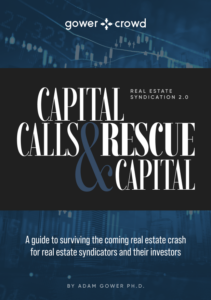Real Estate Investors Care What Other People Say about You, Not What You Say about Yourself
By Adam Gower Ph.D.

From a young age, we’re taught that sticks and stones can break our bones, but words can never hurt us. Unfortunately, that rule doesn’t apply to your company. Words can be exceedingly harmful to your business, or they can be your greatest asset for onboarding new investors.
You can control a lot of things about your image online, but the one aspect you may not be paying enough attention to is what the voices outside your company are saying about you.
Ignoring this could be costing you investors.
Getting the Outside Perspective
Today’s investors and customers are researchers in their own right. Before making any significant purchase, they take their time to read about and understand as much as possible of the opportunity they are considering. One challenge for you is that they’re not doing all their research on your website. A lot of their knowledge about you comes from what other trusted sources are saying.
Your say and your voice doesn’t always come into the mix until they’ve already mostly made their decision. Many people today put their trust in the opinions of third-party sources over the marketing straight from a company spokesperson. The third-party source is seen as less biased, as long as it’s not perceived that they have something to gain from speaking about your company.
Trusted third-party sources are usually those that are already providing value to their audience. They’re Facebook groups, subreddits, forums, high-quality review sites, influencers, etc. that have already built up some clout and have a reputation for speaking their honest opinions.

All of this goes back to a basic concept of marketing: word of mouth makes an impact. Online, word of mouth looks a little different, but it works in the same way. Would you rather trust the salesperson knocking on your door to sell you a product or your best friend who tried the product and recommends it to you? In today’s world, your website is like a door-to-door salesperson and third-party sources are the trusted second opinion.
Directing the Funnel
As you reach out to people and try to make to strengthen connections, you have to pay attention to where people are in their journey.This journey is a sales funnel with many broad ranges. The very top of the funnel is people who have never heard of your company. As you go deeper into the funnel, into the relationship investors are developing with you, people may have heard about you without truly knowing what you do, then they may have some knowledge about your company, and at the very end of the funnel you have investors who become advocates.
For people at the top of the funnel to reach the bottom, they need to see messages about you that portray the right information. They’re looking for a specific kind of information that meets them at their current level. Your job is to make sure the right information is reaching people at the right time in the right place.
Who’s Talking about You?
Do you know where your company is being talked about up and what’s being said about you? This should be part of your online marketing efforts. You should try to be aware of what’s being said about your company and the general opinions expressed by others online, and to be responsive to those.
Understand where your message is spreading organically and what that message is, so you can fill in the gaps and work to correct unflattering perspectives to paint a more complete picture of your company. If you don’t know who’s talking or what they’re saying, you’re a step behind the people you’re trying to reach out to. Their first connection to you is most likely to come from an outside source, with the first visit to your website being when they’re close to making a buying decision or when they’ve already made that decision.
Get access to our FREE weekly newsletter exclusively covering the latest updates from the real estate crowdfunding world
Impacting the Narrative
Just because something is coming from an outside source doesn’t mean you have zero control over what’s being said. Approach outside sources as a sponsor or partner, submit guest posts, keep up your social media accounts with supporting content, and look for every opportunity to influence the direction of the conversation.
What we’re talking about here is not participating in shady practices or trying to lie to investors. It’s just being aware of what people are hearing about you and working to make sure they hear something positive first instead of something negative. This isn’t about being overly promotional or polished either, but is instead about providing the kind of value people are looking for at their current point in the buyer’s journey. From there, you can move forward.
People are getting their information from multiple sources. Learn where your target audience goes and work to get your content in front of them there. If they then move on to do a search on you for more information, make sure they’re finding something that gives a credible look into your company and your value proposition. When they finally get to your landing page, they should have found enough information about you from other sources to formulate a complete picture and be able to make a decision.
***
The brutal truth in online marketing is that other people’s opinions about you matter more than your own words. As beautiful as your content on your site looks and as eloquent as it may be, it won’t be as compelling to an investor as hearing a good review from a trusted outside source.
Keep an eye on what’s out there about your company and do what you can to turn that into something favorable – it will benefit you in the long run.
If you have only just started in real estate development, have completed no deals, have no email list, but know you want the freedom and wealth being a real estate developer brings, then I suggest your first step is to start evaluating deals so you can recognize a good one when you see it.
Here’s where you should start. You’ll learn everything you need to know – the different types of real estate, different development strategies, how real estate cycles influence the market, and all about due diligence.
If you want to find deals and raise money for them so you can start your real estate development business, then learning how to conduct due diligence so you can pitch your deals better to investors is a great place to start.
If you’ve already purchased one or more real estate project and are seeing more opportunities than you can finance, then now is the time to start building your investor network so you can finance all your next deals quicker.
You’ve already got some momentum; now start finding and educating prospects about what you’re doing so you can build an email list of people to pitch to when you’re ready to raise money for your next deal.
This is what we build for private clients all the time – it’s called the Investor Acquisition System and you can access the entire program right here so you can find prospects, and convert them into being deep pocketed, repeat investors in your deals.
If you are a seasoned pro with multi-cycle experience, a substantial portfolio, a decent deal pipeline, and find yourself spending too much time raising equity capital because you’re still doing it in-person, then it’s time you put technology to work for you.
The wonderful thing about doing this is that you’re not going to be doing anything different than you’re already doing and, guess what, you’ll never have to sit through investor meetings again.
Sounds crazy I know, but I lay the whole thing out for you in this white board workshop where I personally show you exactly what it takes for you to transform your equity raising into a fully automated, capital raising machine so you can find new investors while increasing commitments from your existing network.
RELATED ARTICLES






